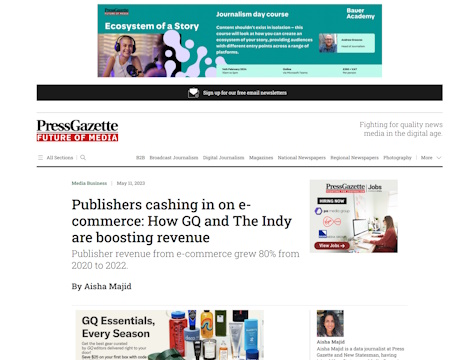How Are Pro Content Providers Getting On- Revenue Wise, Online?

This article from PressGazette had a look at pro content providers like high trust and status magazines online and looked at their revenue growth. Were they getting better, worse or the same? Were they doing different techniques? Were they adding revenue that others didn't.
The results were surprising in the fact that some were only doing some revenue models that have existed online for some time.
The results of the pro content providers revenue models and what we can learn

So below is gong to be bullet points of the article, with some ideas and comments thrown in. 65 publishers answered the study. Thats not magazines- thats their owners which would own more than one magazine. So magazines/ brands include: GQ, Tech Radar, The Sun, The Independent and Marie Claire.
Why is all this important? A survey stated that "Three out of four visitors to GQ.com say that they purchased something following a recommendation by GQ."
- 74% used affiliate marketing
- Each saw growth every year- seems like COVID kept people at home and online (obviously) but also it got people into new habits of online shopping and reading. They seemed more comfortable with it. But. It has also been enlightening for the publishers as well- they have seen online work. So they have invested more into ecommerce.
- Affiliate marketing isnt instant. It is a steady climb. But writing review and recommendation articles is going to help. This is what was a bit puzzling. It seems that some of these publishers havent been doing much of this, even though review sites are great for affiliates. However, The Independent has a section called Indy Best (a recommendation section) which gets tons of SEO love and is a trusted source. Affiliate revenue come from this- since 1990. The Independent also has 20 staff directly involved with ecommerce.
So revenue models don't seem to be disseminated between different content providers and companies.
So what makes the Independent successful in their affiliate endeavours? Here's The Managing Director, Christian Broughton explaining:
"If you trust us on really hard issues like analysing the economy or reporting on a war, when you see our badge next to a review of something fun like headphones, you know that we've given it the same editorial standards," he says. "I think what makes our e-commerce potentially different from some other people's is that we really do give it the level of expertise and specialism."
But it’s more than just making the right picks. Broughton says that the publisher puts a lot of effort into ensuring that readers receive a good shopping experience, by ensuring that reviews and recommendations link to retailers who will have the product at the right price, have it in stock and ship it quickly. "There's a lot of order fulfilment thinking that has to go on behind the product reviews," says Broughton.
- SEO, email and recirculation of traffic is going to be more invested in. The retention of traffic seems to be a pro issue as well
- SEO is helpful but it is not being touted as the main source of traffic due to difficulty ranking for keywords that everyone else is trying to aim for
- Diversification is helpful. It just takes one company like Google or Amazon to change a policy and your rank or commission rate will be affected (like when Amazon dropped some of its commissions way down)
- There is a relationship with the brands and the publishers- therefore you can build an ecommerce experience around them including events, a sponsored TV/ video, an editorial etc
- They know what products their visitors are looking at and requiring
- Written content is cool but some are investing into social media like Facebook and also increasing their videos because you can better demonstrate products that way
- Tools such as curated shopping guides that readers can find through SEO, alerts for sales through the title’s GQ Recommends email have made e-commerce revenue "a very meaningful portion of GQ’s global revenue"
- Quality over quantity rules. many have gone to their roots and then increased products from there. For instance GQ started in fashion then it added more as customers demanded it. Now it offers a subscription box (25% increase in boxes sent in a year), then they added a store just for subscribers where readers can check out approved and reviewed GQ items.
When you take a step back. You can see the obvious. Trust comes first. This has only been able to be done with trusted good content. Then they have added ads, sponsorship and affiliate links where the demand has been. And isn't that an odd but cool thing. To add revenue items because visitors have asked and demanded it.
Check out more selling online articles at the Jasonera blog here.
By Jasonera.com- Copyright © All rights reserved. About. Updates. Disclaimer. Privacy. Mission/ Vision. FAQ


